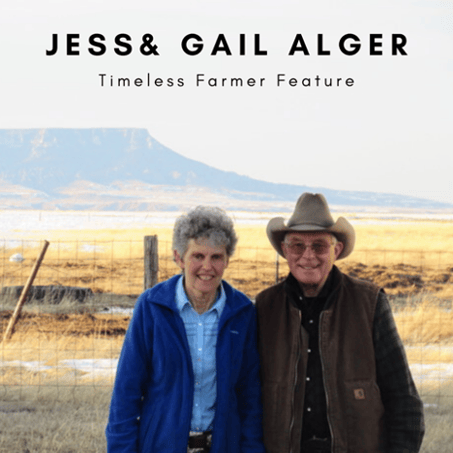Jess and his wife live the quintessential idea of a farming lifestyle -- tending to cattle, gardens, chickens and grain consume their days outside the small community of Stanford, Montana.
 The Alger's transitioned to organic when some of the current farmers out there today were still in diapers. What made them make the switch when fertilizers and glyphosate were all the rage? Jess sat down to tell us.
The Alger's transitioned to organic when some of the current farmers out there today were still in diapers. What made them make the switch when fertilizers and glyphosate were all the rage? Jess sat down to tell us.
Long ago, Jess's dad got connected with a spray company because he was having issues with fan weed. The first year he sprayed his yield was up by ten bushels! He then added fertilizer along with the spray. That next year, he was not only dealing with eradicating fan weed but a whole host of new weeds that their place had never seen. Expensive chemical inputs would be the new normal for the farm even after Jess bought the place in 1990.
"I also used to be a custom sprayer," Jess said.
"There were all types of chemicals for all types of weed problems. I just started noticing that over time the farmers needed more and more chemicals for weed control; the chemicals were getting stronger to suit their needs and it just didn't seem right," he remembers.
In 1999 he transitioned his 1,120-acre farm/ranch to organic. He used crop rotation as a way to reintroduce depleted nutrients to the soil instead of chemicals. In 1994 he met Timeless CEO, Dave Oien, at an Alternative Energy Resource Organization (AERO) event and ended up buying his first seed from Timeless Seeds Inc. It was black medic seed and if you know anything about our history from "Lentil Underground" by Liz Carlisle, you know that this was the crop that helped start a small soil building revolution in Montana.
Jess has used Timeless crops in his rotation ever since! He has grown several types of lentils and his most recent crop for us was Purple Prairie Barley®️. This time of the year, he is waiting for the ground to dry up enough to begin planting.
While largely unaffected in his day-to-day by the worldwide COVID-19 pandemic, he is concerned for lasting effects on the markets. While Jess is currently producing post-pandemic food, will he have buyers for his certified organic grass-finished beef? Will consumers continue to support the companies to which he supplies his certified organic grain? Despite the unknowns, he keeps farming and ranching.
Thank you Jess for all you do!